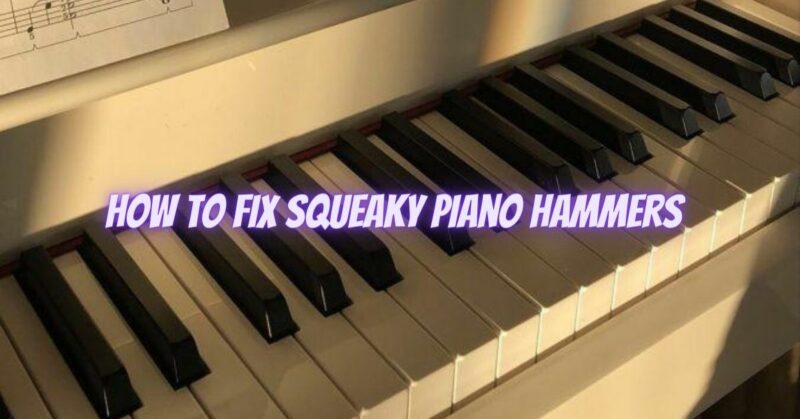Squeaky piano hammers can be a frustrating issue that affects the quality of sound and overall playing experience. The squeaking sound occurs when the hammers strike the strings, and it can be caused by various factors. If you’re facing this problem, don’t worry – there are several steps you can take to fix squeaky piano hammers. Here’s a guide to help you identify the causes and implement the right solutions:
- Identify the Source: Before attempting any repairs, determine which keys are causing the squeaking sound. Play each affected note and listen carefully to pinpoint the problem areas.
- Inspect Hammer Felts: One common cause of squeaky hammers is dry or worn hammer felts. Over time, the felt on the hammers can become dry and cause friction when striking the strings. Carefully inspect the hammer felts for any signs of wear or dryness. If you find any worn felts, they may need to be replaced by a piano technician.
- Apply Lubricant: To reduce friction between the hammer felts and the strings, you can apply a small amount of piano hammer lubricant. Use a specialized lubricant made for piano actions and apply it sparingly to the hammer felts. Be cautious not to over-lubricate, as excessive lubricant can cause other issues.
- Check for Loose Components: Squeaks can also be caused by loose components within the piano action. Inspect the hammer flanges, capstans, and other action parts to ensure they are securely in place. Tighten any loose screws or components to eliminate potential sources of noise.
- Regulate the Piano Action: Proper piano action regulation ensures that the hammers strike the strings at the correct angle and with the appropriate force. If the piano action is poorly regulated, it can lead to uneven hammer movement and squeaking. Consider hiring a professional piano technician to regulate the action properly.
- Clean the Action: Dust and debris can accumulate within the piano action over time, leading to squeaking sounds. Gently clean the action using a soft brush or compressed air to remove any dirt and dust particles.
- Seek Professional Help: If the squeaking persists despite your efforts, it’s best to seek the assistance of a qualified piano technician. They have the expertise and specialized tools to diagnose and resolve complex issues effectively.
- Regular Maintenance: To prevent future squeaking issues, perform regular maintenance on your piano. Keep the instrument in a stable environment with consistent temperature and humidity levels. Regularly schedule tunings and inspections by a professional piano technician.
Conclusion: Squeaky piano hammers can be resolved with proper diagnosis and appropriate solutions. Identifying the cause of the squeak and implementing the right fixes will help restore the piano’s optimal playing condition and ensure a smooth, enjoyable playing experience. Remember to practice regular piano maintenance and seek professional help if needed to maintain your piano in its best condition for years to come.


